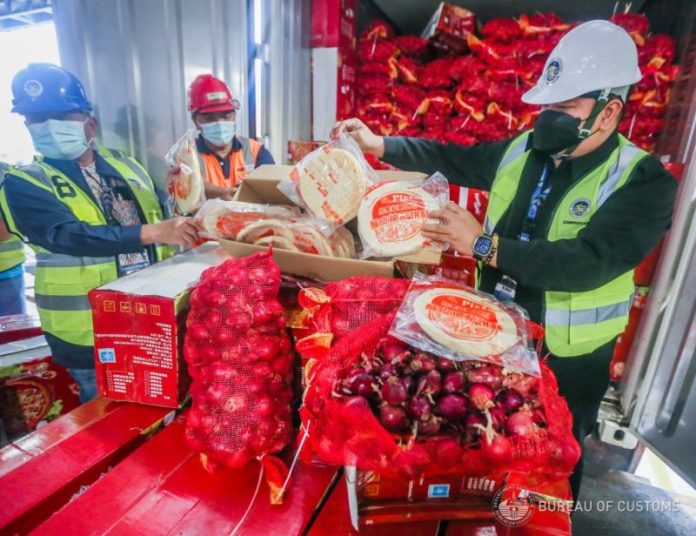-
The Senate has approved on third and final reading the Anti-Agricultural Economic Sabotage Act
-
Earlier certified as urgent by President Ferdinand Marcos, Jr., Senate Bill No. 2432 will repeal the Anti-Agricultural Smuggling Act of 2016
-
SB 2432 seeks to boost agricultural productivity, shield farmers and fishermen from dishonest traders and importers, and guarantee fair prices for agricultural and fishery products for consumers
The Senate has approved on third and final reading the Anti-Agricultural Economic Sabotage Act.
Earlier certified as urgent by President Ferdinand Marcos, Jr., Senate Bill No. 2432 seeks to repeal the Anti-Agricultural Smuggling Act of 2016 or Republic Act No. 10845.
SB 2432 aims to promote the productivity of the agriculture sector and to protect farmers and fisherfolk from deceitful traders and importers and maintain reasonable prices of agricultural and fishery products for consumers.
The proposed legislation defines smuggling as the fraudulent act of importing agricultural and fishery products without proper permits or using permits for unauthorized individuals.
Economic sabotage, in the context of agricultural smuggling, occurs when the value of the smuggled products reaches at least P3 million, computed using the daily price index, at the time the crime was committed.
Compared to RA 10845, economic sabotage under SB 2432 involves large-scale smuggling of specific agricultural products valued at a minimum of P1 million, except for rice, which is set at P10 million by the Bureau of Customs.
SB 2432 considers agricultural smuggling as importing products without proper permits, using permits improperly, or using fake permits.
The regulation includes prohibiting the selling, lending, or allowing the use of import clearances by entities other than those named in the permit. Additionally, agricultural smuggling encompasses misclassification, undervaluation, or misdeclaration during import filing to evade rightful taxes and duties. Using dummy entities to obtain import permits and acting as a broker for violating importers are also deemed smuggling activities.
SB 2432 expands coverage to include the use of private ports, fish ports, fish landing sites, resorts, and airports in perpetuating economic sabotage.
Meanwhile, agricultural hoarding occurs when a person or group keeps more than 30% of their usual stock of agricultural and fishery products two weeks after the Anti-Agricultural Economic Sabotage Council (AAESC) declares an abnormal situation or when there is an emergency or state of calamity.
The AAESC, led by the President or a designated representative, will be established to ensure the effective enforcement of the proposed measure.
Agricultural profiteering, defined as selling products at least 10% above the fair price during abnormal situations or emergencies, is also deemed economic sabotage. The bill identifies cartel activities as engaging in uniform, simultaneous, or complementary acts to manipulate supply or prices of agricultural products, stifling competition.
Under SB 2432, anyone breaking the proposed law can face life imprisonment and a fine three times the value of the agricultural and fishery products involved in the economic sabotage. Section 11, focusing on financing these crimes, carries a penalty of life imprisonment.
Owners or lessees of vehicles transporting the products, as well as those storing them in warehouses, cold storage facilities, or other properties, may receive imprisonment of 20 to 30 years and a fine double the product’s value. The same penalty applies to registered owners or managers of private ports, fish ports, fish landing sites, resorts, and airports permitting entry of the products.
Drivers, warehouse staff, and similar personnel knowingly involved in the crime could face imprisonment ranging from two to four years. Members of the Anti-Agricultural Economic Sabotage Enforcement Group found guilty may be imprisoned for six to twelve years, with perpetual disqualification from public office, voting, and participating in elections, along with a fine between P500,000 and P1 million.
Government officers or employees committing economic sabotage or corrupt practices related to it may face penalties, including perpetual disqualification, forfeiture of benefits, and fines. All violations fall under the exclusive jurisdiction of the Court of Tax Appeals.
The Senate bill was passed on December 11 with 18 affirmative votes, 0 negative votes, and 0 abstentions.
The Lower House counterpart bill was approved on September 27 in its third and final reading. – Roumina Pablo





